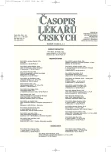-
Medical journals
- Career
Determination of needs of terminally ill patients in the hospice care
Authors: Radka Bužgová 1; Kateřina Havelková 2
Authors‘ workplace: Ústav ošetřovatelství a porodní asistence, Lékařská fakulta, Ostravská univerzita 1; Hospic sv. Lukáše, Ostrava 2
Published in: Čas. Lék. čes. 2012; 151: 190-195
Category: Original Article
Overview
Background.
The aim of palliative care is the solution of bio-psycho-social and spiritual problems of patients and achievement of the highest possible quality of life. This is related to a need of understanding the patient and his needs. The aim of our research was to determine bio-psycho-social-spiritual needs of patients in hospice care in conjunction with the quality of life and rate of their saturation. Further then to determine, whether the needs vary depending on length of stay in hospice, gender, age and religion.Methods and results.
The sample consisted of 36 patients from the hospice of St. Luke in Ostrava. For data collection we used modified questionnaire for the identification of needs PNPC and questionnaire for assessing the quality of life EORTC QOL-C30. As the most important need patients considered the privacy (4,80), the opportunity to make their own decisions (4,77), treatment with respect and dignity (4,75) and pain relieve (4,72). The most frequently reported problem was fatigue, sleep and fear of addiction. Patients have positively rated pain prevention. In repeated measurements were reported significant improvements of assessment of saturation needs in 10 items (p<0,05). The patients evaluated overall quality of life rather positively. A relationship between quality of life and saturation of needs in the area of autonomy and physical needs (p<0,05) was found.Conclusions.
During the stay in hospice patients’ satisfaction with saturation of some needs and overall assessment of quality of life increased.Key words:
palliative care, need, quality of life, hospice.
Sources
1. Zemřelý 2010. ÚZIS ČR, 2011. http://www.uzis.cz/publikace/ zemreli-2010.
2. Sláma O, et al. Paliativní medicína pro praxi. Praha: Galén 2007.
3. Haškovcová H. Thanatologie. Nauka o umírání a smrti. Praha: Galén 2007.
4. Svatošová M. Hospice a umění doprovázet. Kostelní Vydří: Karmelitánské nakladatelství 2008.
5. Svatošová M. Hospice a umění doprovázet. Praha: Ecco Homo 2003.
6. Bužgová R. Hodnocení psychosociálních potřeb terminálně nemocných. Kontakt 2011; 13 : 265–274.
7. Richardson A, et al. Patients’ Needs Assessment Tools in Cancer Care: Principles and Practice. London: NHS Trust, 2005.
8. Osse B, et al. A practical instrument to explore patients’ needs in palliative care: the Problem and Needs in Palliative Care questionnaire. Palliative Medicine 2007; 21 : 391–399.
9. Fayers PM, et al. The EORTC QLQ-C30 Scoring Manual (Third edition). Brussels: EORT C Quality of life Group 2001.
10. Bužgová R, Macháčková G. Hodnocení potřeb terminálně nemocných v domácí péči: pilotní studie. Praktický lékař 2012; 92 : 109–114.
11. Davies E, et al. Systematic review of specialist palliative day-care for adults with cancer. Support Care Cancer 2005; 13 : 607–627.
12. Křivohlavý J. Psychologie nemoci. Praha: Grada Publishing 2002.
13. McIllmurray MB, et al. Psychosocial needs in cancer patients related to religious belief. Palliative Medicine 2003; 17 : 49–54.
14. Vymětal J. Lékařská psychologie. Praha: Portál 2003.
15. Kissane D, Yates P. Psychická a existenciální tíseň. In: O’connor M, Aranda S. Paliativní péče pro sestry všech oborů. Praha: Grada Publishing 2005; 189–200.
16. Křivohlavý J. Sestra a stres. Praha: Grada Publishing 2010.
17. Topinková E. Geriatrická paliativní péče a péče o umírající. Česká geriatrická revue 2004; 1 : 14–21.
18. Svatošová M, et al. Hospic slovem a obrazem. Praha: Ecce Homo 1998.
19. Opatrný A. Jak zmírnit niterná trápení nemocných? Kostelní Vydří: Karmelitánské nakladatelství 2004.
Labels
Addictology Allergology and clinical immunology Angiology Audiology Clinical biochemistry Dermatology & STDs Paediatric gastroenterology Paediatric surgery Paediatric cardiology Paediatric neurology Paediatric ENT Paediatric psychiatry Paediatric rheumatology Diabetology Pharmacy Vascular surgery Pain management Dental Hygienist
Article was published inJournal of Czech Physicians

-
All articles in this issue
- Determination of needs of terminally ill patients in the hospice care
- Cystic polyposis of the stomach (fundic gland polyps) – relationship to the absence of Helicobacter pylori infection and a therapy with drugs suppressing gastric acidity
- Comparison of the overall stress during large bowel operations in senior patients (laparoscopy versus open surgery)
- Electronic cigarette
- The fate of a model of Pathological Anatomy Institute of Medical Faculty in Prague
- Perspectives on pharmacological and clinical benefits from sirtuin 1 activators in oxidative damage
- Journal of Czech Physicians
- Journal archive
- Current issue
- Online only
- About the journal
Most read in this issue- Cystic polyposis of the stomach (fundic gland polyps) – relationship to the absence of Helicobacter pylori infection and a therapy with drugs suppressing gastric acidity
- Electronic cigarette
- Determination of needs of terminally ill patients in the hospice care
- Perspectives on pharmacological and clinical benefits from sirtuin 1 activators in oxidative damage
Login#ADS_BOTTOM_SCRIPTS#Forgotten passwordEnter the email address that you registered with. We will send you instructions on how to set a new password.
- Career

